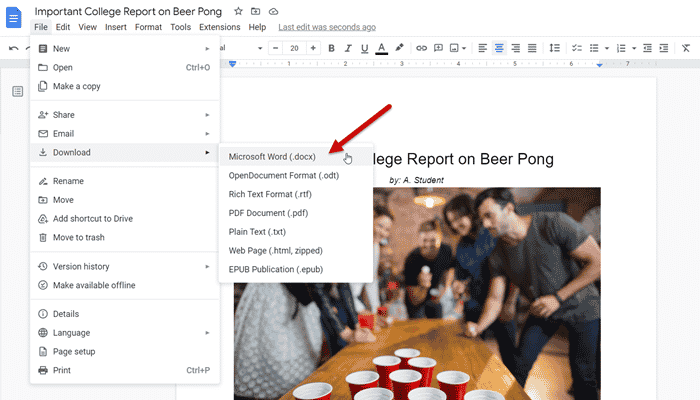Are you a student preparing to start college soon? Or is your teenager heading off to college this year? A good computer is essential for the rigors of an academic workload. But what kind of computer is best? Is a Chromebook good enough, or do you need a traditional laptop? Today, I’ll share a full Chromebook vs laptop for college comparison, highlighting the unique features of Chromebooks that make them ideal for many college students. I’ll also explain where they may come up short when compared to a Windows laptop.
By the end of this article, you’ll be able to make an informed decision about whether an inexpensive Chromebook or a pricier laptop will be the best fit for your time on campus.

I own a Chromebook, a traditional laptop, and a desktop PC and use all three for different purposes, and can share some of that experience to help you make an informed choice about whether a Chromebook is good enough for college students.
Here’s an outline of what I’ll discuss:
- What is a Chromebook?
- Chromebook vs Laptop for College Students: Which is Better?
- Chromebooks Have Some Useful Advantages
- You Cannot Install Microsoft Office on Chromebooks
- Different Varieties of Chromebook
- Chromebook vs Windows Laptop Price Differences
- My Recommendations At the end of the article I share my favorite 2 Chromebook, and 2 Traditional Laptop models
Let’s get started!
What is a Chromebook?
A Chromebook is simply a personal computer that uses the Chrome OS (operating system). If you can do something with Google Chrome, you can definitely do it on a Chromebook, and using Google Docs, Sheets, YouTube, and pretty much any app in the Google ecosystem is snappy and easy with a Chromebook.

You won’t have to install or use software or do any updates to use the Chromebook. When you buy it and get it home, you can simply open it and begin using it.
While a Chromebook looks similar to a Windows laptop, there are significant differences between these two devices.
For one thing, the chips in Chromebooks don’t perform as well as those found in Windows laptops. Most low to mid-price Chromebooks have cheaper processors (that’s a big reason why they’re less expensive).
There are some more expensive Chromebook varieties on the market that have Intel chips, so if that’s important to you and you want to use a Chromebook, you still have some good options.
A traditional PC laptop has the Windows operating system, and it uses Windows applications. With a Windows PC, you enjoy a wide array of features, such as high-powered graphics cards.

This makes them more versatile than Chromebooks.
Chromebooks, on the other hand, run on the Chrome OS. This operating system is based on the Google Chrome web browser.
Newer Chromebooks are more versatile than older ones as they’re able to run pretty much all of the Android apps you may know and love.
A Unique Approach to Laptop Memory & Storage
Chromebooks have a lot less storage than Windows laptops. A Chromebook will usually have approximately 16 GB of storage.
Windows laptops, on the other hand, generally have much more local storage. In fact, 128 GB is considered on the lower end of a traditional laptop. That means an entry level traditional laptop has 8 times the storage capacity of a typical Chromebook … a big difference!).
One reason for this difference is the fact that Chrome OS (as well as the apps it will run) don’t require the same storage space as you need on a Windows device.
With Windows you’re saving your files locally and need that space. With a Chromebook your documents and spreadsheets are saved to the cloud in your Google Drive account – meaning they are accessible from any device and don’t take up any local resources on your Chromebook.
Not only does this free up local memory on your device, it means all of your files are backed up all the time.
Spill a beer on your Chromebook?
No problem – you can still print out that big essay or report from any computer at the library and turn it in on time.
The biggest downside to a Chromebook might be that the “my computer crashed” excuse is no longer viable.
Chromebook vs Laptop for College Students
Which Is the Better Choice?
A Chromebook can be an excellent choice if the student is mainly using their device for browsing the web, word processing, and streaming audio and video. Any Chromebook you buy will be able to handle all of these tasks without issue, and it’s how I use my Chromebook just about every day.

Over time you may need to upgrade your cloud storage beyond the 15GB you get for free, but it’s around $20 for an extra 100GB of storage, so for most users that’s not a big deterrent.
You can also use USB drives and SD cards for storing documents, but why would you? Keep it in the cloud, baby.
Flip Your Thinking About Traditional Features
For some students, the fact that Chromebooks don’t have as many features as a traditional laptop is actually an advantage. Why? Well, there are fewer distractions when they’re working.
Many Chromebook users will type their work in Google Docs and then directly share their papers with their instructors or professors. You can purchase the Microsoft Office suite if your professor requires files in .DOCX format, but Google Docs has an option to save any of your files in traditional format so you can send that big college report as an email attachment if your teacher is old-school:

Chromebooks are also good at stopping you from ending up with virus problems or malware. Most young people are pretty savvy about spotting phishing links and suspect downloads, but if you ever inadvertently install a program with a virus, you can easily wipe and reset your Chromebook.
Opting for a Chromebook or a Windows laptop is a personal decision. If you enjoy gaming, why are you even reading this – buy a gaming laptop.
But if you’re buying a computer for schoolwork, either will work well and you should base your choice on your needs and budget, period.
Here are what I consider to be the most important factors to consider when making your choice:
Storage
As touched on earlier, Windows laptops have more versatility and a lot more storage space, but that doesn’t matter if you’re saving everything to the cloud (and you should).
Boot Up Time
Many windows laptops come with the baggage of a traditional desktop computer. They take longer to boot up, you will have to do updates, and crashes can be difficult to deal with.
Open a Chromebook and it’s ready to go in seconds … basically as soon as you can open it it’s waiting for you. When I first bought a Chromebook (actually, I think my wife gave it to me for my birthday) I was amazed by how quickly it “woke up.” I’d never experienced that before, even with my desktop PC which has a premium SSD.
Printing
Windows laptops might have an edge when it comes to direct printing. Some users report that Chromebooks can have difficulties in this area, because they’re built on the pretext of online collaboration and sharing virtual documents.

But to be honest, I have not experienced any issues with this. I’m able to Ctrl+P and print to PDF or find my wireless printer like a boss.
Viruses and Vulnerability to Hackers
A Windows laptop will have more vulnerabilities to hackers, because most viruses are written to target the windows OS.
Also, it will need more frequent maintenance to keep it safe and secure, and you’ll want to install virus and or malware protection like Kaspersky or McAfee. This may just be keeping up to date with software updates, or buying licenses.
Either way, Chromebooks are a lot more secure and virus-proof – most of your concern with a Chromebook should be with connecting to unsecure networks.
Chromebooks Have Some Useful Advantages

Chromebook’s Chrome operating system is extremely lightweight. A Chromebook will be preloaded with several apps, including calendar, mail, and text editor.
You can access thousands of other apps through the Google Play store.
Most Chromebook models have a camera you can use for remote learning and video conferencing (I use mine all the time for that purpose – conferencing with my daughter’s teacher, and for telehealth).
The fact that Chromebooks lack several of the internal components you find with a Windows laptop (such as a dedicated graphics card and a large hard drive) is often thought of as a drawback, but I think the opposite is actually true.
What this means in the wild is that Chromebooks tend to have longer battery lives and be much lighter weight.
While it’s true that a Chromebook will have a lower-performance processor than you would get with a Windows laptop, it will be much more affordable.
And the truth is unless you’re going to college for a degree that will require those demanding apps (think graphic design, computer engineering, etc.), you probably don’t need to use those applications and tools.
There have recently been new Chromebook models introduced that have more power, but these are more expensive, and if you need that extra power you’re better off going with a laptop anyway.
You Cannot Install Microsoft Office on Chromebooks
You cannot install the complete MS Office software on Chromebooks. This is a major drawback for some students, though as I mentioned before you can save all of your documents and spreadsheets in Microsoft format if you need to for school.
Also, you can use Microsoft’s web-based version of Office, as well as the Android version. These are available in the Google Play and Chrome stores.
You also won’t be able to do advanced video-editing and photo-editing with a Chromebook. You can do basic editing of videos and photos, but you won’t get the type of graphics performance you would get with a Windows laptop.
If you do get a Chromebook and want to do some of this, I recommend that you check out the Adobe apps that are available.
There Are Many Different Kinds of Chromebook
Originally and up until recently, Chromebooks had a pretty much uniform design and set of capabilities.
Today, however, there are many more types of Chromebook. There are different sizes and capabilities available.

If you have decided that a college Chromebook has what you are looking for and you don’t need a laptop, think carefully about what you actually need and choose the right Chromebook. A lot of the newer and upgraded models have a lot of extra features that you really don’t need and that will cost you a lot more than the old Chromebooks.
There are Chromebooks available that have high-end processors and larger memory capabilities. If you need that, make sure to look for it, but if you don’t – look for it anyway and skip those models.
In general, these are the general specifications most people look for in a Chromebook:
- Intel Celeron, Core-i-series, or Core m-series processor
- A minimum of 4GB of memory (RAM)
- At least 64 GB of storage
- Full HD display (look for specifications of 1,920 X 1,080 pixel regardless of screen size)
Cost of a Chromebook vs Windows Laptop for College
You can often find Chromebooks several hundred dollars cheaper than some Windows laptops, and for a college student this is an important factor that you shouldn’t be discounted.

Different Chromebooks have varying price tags, and how much you pay will depend on the type of Chromebook and its features. The two I recommend below will both run you around $300 or less for most of the year. It’s possible to find refurbished Chromebooks for under $200, but I’d recommend spending the extra $100 and buying a brand new one if you can afford it.
Laptops, on the other hand, tend to start at higher prices than Chromebooks, with the two models I recommend as solid options below coming in at a price tag above $500.
As time passes, Chromebooks will get more advanced features, which will probably drive the price up. For example, Google Pixelbook was the first Chromebook to ever come with Google Assistant.
| SuiteGuides.com is reader supported. If you make a purchase after clicking a link, we may earn a commission at no additional cost to you. |
My Recommendations for a Chromebook for Students
If you decide to go with a Chromebook, these are two solid budget-friendly models that you should consider:
- Acer Chromebook 314 (check price & reviews on Amazon) – A solid, no-frills Chromebook with a 14″ display, Gigabit WiFi connection and Intel Celeron Processor and Chrome OS.
- 2022 Flagship Lenovo Chromebook Flex 3 (check price & reviews on Amazon) – A lightweight 2-in-1 (touchscreen laptop/tablet) with an 11.6″ display and Chrome OS.
My Recommendations for a Traditional Laptop for Students
If you decide to go with a traditional laptop, these are two solid, budget-friendly models that you should consider:
- 2022 Lenovo IdeaPad 3 (check price & reviews on Amazon) – An excellent mid-level laptop with a 15.6″ touchscreen display, Intel Core i3 processor, and plenty of RAM and a good SSD hard drive. Comes pre-loaded with Windows 11 Home.
- Microsoft Surface Laptop 4 (check price & build your own at Microsoft.com) – If you have the budget for it, Microsoft’s Surface 4 Laptop is one of the top-performing traditional laptops. Available in 13.5″ or 15″ touchscreen with amazing 201 PPI resolution and excellent AMD Ryzen and Intel Core i5 and i6 processors available. Free upgrade to Windows 11 included. You can configure your own on the Microsoft website and enjoy a great 60-day return policy.
Chromebook vs Laptop for College (my final thoughts)
Chromebooks and Windows laptops both have a lot to offer, and when you’re starting your college journey, you want to invest in a portable computer that will be reliable and allow you to tackle all of your coursework.
The option that is right for college students depends on their individual needs and preferences, but in my view a Chromebook will work for most college students, and it’s the better choice unless you’re studying graphic design, computer programming, or going into similar fields which demand specialized programs and more computing power.


thank you, this was so helpful and well laid out.
Glad you found it helpful, Paige!
Thank you for your article. I just recently purchased a Chromebook and was like, what is this? I had been using a Windows laptop for several years and it just went out. When first got the Chromebook and opened it up, I thought it was a child’s computer. I am a college student and I thought I had made the wrong decision. Your thoughts on Chromebooks made me fill more confident about my purchase. Thank you!
Great – glad this was helpful, Tonya. It definitely takes a bit to get used to it, but I hope you love your Chromebook!